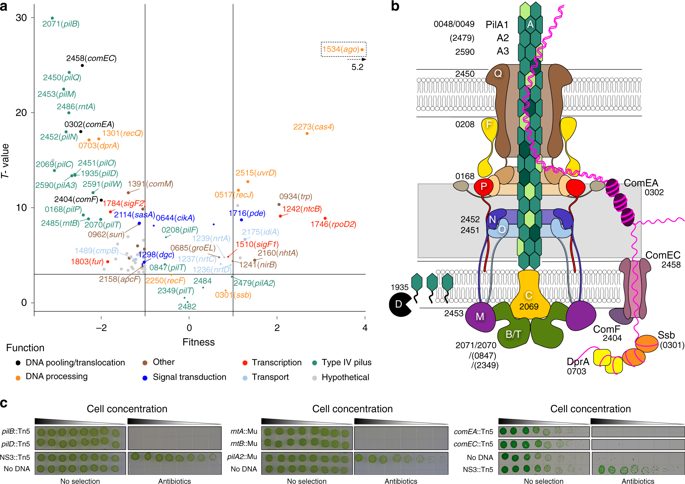当前位置:
X-MOL 学术
›
Nat. Commun.
›
论文详情
Our official English website, www.x-mol.net, welcomes your
feedback! (Note: you will need to create a separate account there.)
The circadian clock and darkness control natural competence in cyanobacteria.
Nature Communications ( IF 14.7 ) Pub Date : 2020-04-03 , DOI: 10.1038/s41467-020-15384-9 Arnaud Taton 1 , Christian Erikson 1, 2 , Yiling Yang 3, 4 , Benjamin E Rubin 1, 2 , Scott A Rifkin 1 , James W Golden 1 , Susan S Golden 1, 3
Nature Communications ( IF 14.7 ) Pub Date : 2020-04-03 , DOI: 10.1038/s41467-020-15384-9 Arnaud Taton 1 , Christian Erikson 1, 2 , Yiling Yang 3, 4 , Benjamin E Rubin 1, 2 , Scott A Rifkin 1 , James W Golden 1 , Susan S Golden 1, 3
Affiliation

|
The cyanobacterium Synechococcus elongatus is a model organism for the study of circadian rhythms. It is naturally competent for transformation-that is, it takes up DNA from the environment, but the underlying mechanisms are unclear. Here, we use a genome-wide screen to identify genes required for natural transformation in S. elongatus, including genes encoding a conserved Type IV pilus, genes known to be associated with competence in other bacteria, and others. Pilus biogenesis occurs daily in the morning, while natural transformation is maximal when the onset of darkness coincides with the dusk circadian peak. Thus, the competence state in cyanobacteria is regulated by the circadian clock and can adapt to seasonal changes of day length.
中文翻译:

昼夜节律和黑暗控制着蓝细菌的自然能力。
蓝藻延长菌是研究昼夜节律的模型生物。它自然具有转化的能力-也就是说,它吸收了环境中的DNA,但是其潜在机制尚不清楚。在这里,我们使用全基因组筛选来识别长链金枪鱼自然转化所需的基因,包括编码保守的IV型菌毛的基因,已知与其他细菌的能力相关的基因,以及其他基因。毛发生物发生在每天的早晨,而当黑暗的发作与黄昏的昼夜节律峰相吻合时,自然转化最大。因此,蓝细菌的能力状态由昼夜节律调节,并且可以适应白天的季节性变化。
更新日期:2020-04-24
中文翻译:

昼夜节律和黑暗控制着蓝细菌的自然能力。
蓝藻延长菌是研究昼夜节律的模型生物。它自然具有转化的能力-也就是说,它吸收了环境中的DNA,但是其潜在机制尚不清楚。在这里,我们使用全基因组筛选来识别长链金枪鱼自然转化所需的基因,包括编码保守的IV型菌毛的基因,已知与其他细菌的能力相关的基因,以及其他基因。毛发生物发生在每天的早晨,而当黑暗的发作与黄昏的昼夜节律峰相吻合时,自然转化最大。因此,蓝细菌的能力状态由昼夜节律调节,并且可以适应白天的季节性变化。











































 京公网安备 11010802027423号
京公网安备 11010802027423号